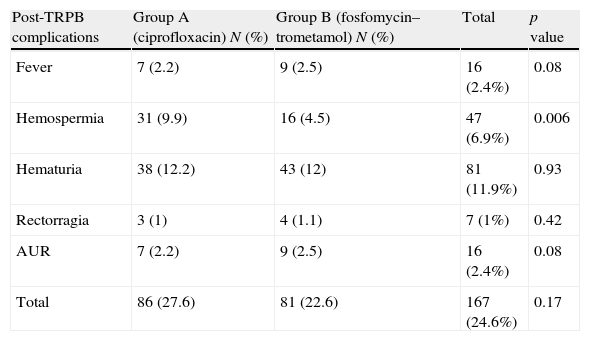Prostate biopsy is the standardized diagnostic method for prostate cancer. However, although there is not a standardized protocol, there are recommendations in order to reduce the incidence of complications. The objective of the present work is to assess the efficacy and safety of antibiotic prophylaxis in the prostate biopsy by comparing two antibiotic regimes: two doses of fosfomycin-trometamol 3g (FMT) every 48h with 10 doses of oral ciprofloxacin 500mg every 12h for 5 days.
Material and methodsRandomized prospective study was performed with 671 patients who had undergone to walking transrectal ultrasound guided prostate biopsy. Patients of group A (n=312) were treated with ciprofloxacin, and patients of group B (n=359) with FMT. Efficacy and tolerability of two prophylactic regimes were compared. Urine culture was carried out at 2 weeks after biopsy. Initially, patients with asymptomatic bacteriuria were not treated with antibiotics; urine culture was repeated after 1 month, persistent bacteriuria was treated according to antibiogram.
ResultsNo differences between groups were found in age (p=0.78), cancer presence (p=0.9) or number of biopsy cylinders (p=0.93). The mean number of cores obtained was 11.3±3.25 (range 6–20). Digestive intolerance was observed for 9 patients (2.9%) of group A and 10 patients (2.8%) in group B. One patient (.3%) of group A showed severe allergic reaction. In total, 167 patients (24.6%) had complications: 16 (2.4%) fever, 47 (6.9%) hemospermia, 81 (11.9%) hematuria, 7 (1%) rectal bleeding and 16 (2.4%) urinary retention. No statistically differences between groups were observed (27.6% vs. 22.6%; p=0.17). However, hemospermia was more frequent in group A (9.9% vs. 4.5%; p=0.006). Bacteriuria after biopsy was detected in 44 patients (6.6%), being more frequent in group B patients (4.2% vs. 8.6%; p=0.02) although a higher number of second treatment cycles were not needed (53.9% vs. 29%; p=0.17). The likelihood of resistance to ciprofloxacin in patients with bacteriuria in A was greater than that of FMT in B (69.2% vs. 41.9%; p=0.0004).
ConclusionsAntibiotic prophylaxis with FMT (2 doses of 3g) in prostate biopsy is an alternative as effective and safe as ciprofloxacin (10 doses of 500mg), which carries lower rate of resistance. According to our experience, this drug is a safe, well-tolerated, and easily manageable prophylactic option, facilitating patient compliance. More prospective multicenter studies are necessary to confirm these findings.
La biopsia de próstata constituye el estándar de diagnóstico del cáncer de próstata. No existe un protocolo estandarizado, pero sí recomendaciones que ayudan a disminuir la incidencia de complicaciones. El objetivo de este trabajo es evaluar la eficacia y seguridad de la profilaxis antibiótica en biopsia prostática comparando 2 dosis de fosfomicina-trometamol (FMT) 3g (cada 48h) con 10 de ciprofloxacino oral 500mg (cada 12h, 5días).
Material y métodosEstudio prospectivo aleatorizado con 671 pacientes sometidos a biopsia prostática transrectal ecodirigida ambulante. El grupo A (n=312) recibió ciprofloxacino y el B (n=359) FMT. Se comparó la eficacia de ambos regímenes y tolerabilidad del tratamiento. Se practicó cultivo de orina a las 2 semanas de la biopsia. Los pacientes con bacteriuria asintomática no recibieron tratamiento antibiótico inicialmente, y se les practicó un nuevo cultivo de orina al mes, tratándose la bacteriuria persistente según el antibiograma.
ResultadosNo existieron diferencias entre grupos respecto a la edad (p=0,78), presencia de cáncer (p=0,9) o número de cilindros (p=0,93). El número medio de cilindros obtenidos fue 11,3+3,25 (rango: 6–20). Nueve pacientes (2,9%) en A y 10 (2,8%) en B presentaron intolerancia digestiva. Un caso (0,3%) en A presentó reacción alérgica severa. En total 167 (24,6%) presentaron complicaciones: 16 (2,4%) fiebre, 47 (6,9%) hemospermia, 81 (11,9%) hematuria, 7 (1%) rectorragia y 16 (2,4%) retención urinaria. No se detectaron diferencias entre grupos (27,6 vs. 22,6%; p=0,17), pero sucedió más hemospermia en A (9,9 vs. 4,5%; p=0,006). En 44 (6,6%) se detectó bacteriuria tras la biopsia, más frecuente en B (4,2 vs. 8,6%; p=0,02), aunque sin precisar mayor número de segundos tratamientos (53,9 vs. 29%; p=0,17). La probabilidad de resistencia a ciprofloxacino en pacientes con bacteriuria en A fue mayor que la de FMT en B (69,2 vs. 41,9%; p=0,0004).
ConclusionesLa profilaxis antibiótica en la biopsia prostática con FMT (2 dosis de 3g) es una opción igual de eficaz y segura que ciprofloxacino (10 dosis de 500mg), que conlleva menor tasa de resistencias. En nuestra experiencia la profilaxis con este fármaco es una opción segura, bien tolerada y de cómoda administración, lo que facilita su cumplimiento. Se necesitan estudios multicéntricos prospectivos que confirmen estos hallazgos.
Artículo
Comprando el artículo el PDF del mismo podrá ser descargado
Precio 19,34 €
Comprar ahora








